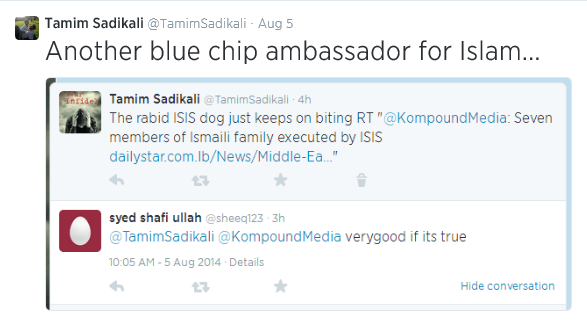Facetiousness aside, the question raised is entirely valid. The author is a political scientist and thus, like a journalist, will be particularly exposed to such imagery. But the Internet has proved a great leveller – from beheadings to bestiality, it’s all just a click away. Furthermore, social media has transformed people from passive consumers of news, into active participants in the Information Wars; shaping opinion and setting the agenda via what is posted and shared online. And as the stakes get higher, any due courtesy for ‘taste’ or decency is sacrificed, to drive home a point. Thus the concern applies beyond those with a professional interest – to the rest of us too, observing our warring world via a comfy chair, a broadband connection and a steaming cuppa.
Never has this been more evident than during Israel’s July 2014 assault on Gaza, during which armchair warriors from across the globe flooded every channel with their version of truth.
Since then, the impetus has been stolen by those fighting in Syria and Iraq, with, ironically, ISIS Jihadis and their opponents posting identical photos – in both cases, to show the world what medieval warfare and remorselessness really look like. And thus the author’s concerns hold weight - the 360-degree, 24/7 bombardment with images from, what we until recently believed was another age, may well leave some psychic detritus.
But before we turn to liquor or Deepak Chopra to soothe our furrowed brows, we should ponder on the trauma levels of those enmeshed in such chaos. A good place to start is September 11th, 2001, and the intimate examination of human suffering that followed the attack on the Twin Towers.
Every life so suddenly taken, every mother, widow and orphaned child; all those anguished embraces, bitter tears and acts of heroism – it was zoomed in on, played forward in slow-mo, put on a loop and preserved for eternity. America will, in a quite literal sense, never forget.
Clearly, the same trauma amongst viewers was evident back then – in fact, far more so. For these weren’t just gory pictures from afar, these were ‘our’ own people, our kith and kin, with the immediate and subsequent footage making New Yorkers of us all. But, as traumatic as it was to take in, the psychic harm done to watchers-on was nothing as compared to those caught in the eye of the storm – and thus we just continued soaking it all in, in reverential silence. Indeed, to give more than fleeting thought to personal distress, would instinctively have felt wrong – no, *obscene*.
Now let’s fast forward to the present, and Jihadis bringing beheadings gate-crashing into the 21st Century... The shockwaves from that macabre ‘theatre’ have rippled across the globe, and, arguably, forced the Obama administration into military action. However, that begs the question, why haven’t the deaths of thousands of Iraqis, Syrians and Kurds at the hands of the same butchers, evoked similar distress? Sure, pictures of dead Arabs can put one off one’s coffee, but do they trigger the same dissonance as, say, an American in an orange jumpsuit, kneeling helpless in the desert..? As the ISIS commander well knows, a thousand dead Wogs ain’t worth one dead American.
 |
| An unknown Kurd |
To a degree, the difference in reaction is entirely natural –
we all have a sense of ‘our own’, and no-one need apologise for feeling a
heightened empathy with a defined subset of humanity. However, where the
disparity is such that one no longer sees others through the same, human lens, those
on the receiving end will react.
In Jay Ulfelder's sober, intelligent and cogently argued piece, there is
actually no hole to pick. Except to say that if you are feeling bruised by what you see on the
news or online, by all means, light a scented candle and re-align your Chakras
- but understand the context for the assault on your Timelines. For until the BBC/Fox/CNN audience get that Wogs are flesh-and-blood human beings, whose
deaths leave the same, terrible wounds on loved-ones left behind, people will feel
compelled to keep ramming that point home.









































